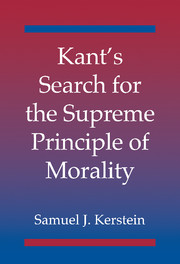Book contents
- Frontmatter
- Contents
- Acknowledgments
- Key to Abbreviations and Translations
- Introduction: Derivation, Deduction, and the Supreme Principle of Morality
- 1 Fundamental Concepts in Kant's Theory of Agency
- 2 Transcendental Freedom and the Derivation of the Formula of Universal Law
- 3 The Derivation of the Formula of Humanity
- 4 The Derivation of the Formula of Universal Law: A Criterial Reading
- 5 Criteria for the Supreme Principle of Morality
- 6 Duty and Moral Worth
- 7 Eliminating Rivals to the Categorical Imperative
- 8 Conclusion: Kant's Candidates for the Supreme Principle of Morality
- Notes
- Index
5 - Criteria for the Supreme Principle of Morality
Published online by Cambridge University Press: 06 September 2009
- Frontmatter
- Contents
- Acknowledgments
- Key to Abbreviations and Translations
- Introduction: Derivation, Deduction, and the Supreme Principle of Morality
- 1 Fundamental Concepts in Kant's Theory of Agency
- 2 Transcendental Freedom and the Derivation of the Formula of Universal Law
- 3 The Derivation of the Formula of Humanity
- 4 The Derivation of the Formula of Universal Law: A Criterial Reading
- 5 Criteria for the Supreme Principle of Morality
- 6 Duty and Moral Worth
- 7 Eliminating Rivals to the Categorical Imperative
- 8 Conclusion: Kant's Candidates for the Supreme Principle of Morality
- Notes
- Index
Summary
Plan of Discussion: Focus on First Criterion
If the argument of Chapter 4 has been successful, then it is apparent that in the Groundwork, from the Preface all the way up to the statement of the Formula of Universal Law in Section II, Kant develops criteria that the supreme principle of morality must fulfill. According to his basic concept, already implicit in the Preface, this principle must be practical, absolutely necessary, binding on all rational agents, and serve as the supreme norm for the moral evaluation of action (section I.2). Later in the Groundwork Kant develops four additional criteria (Chapter 4). The supreme principle of morality must be such that: (1) all and only actions conforming to this principle because the principle requires it – that is, all and only actions done from duty – have moral worth; (2) the moral worth of conforming to this principle from duty stems from its motive, not from its effects; (3) an agent's representing this principle as a law, that is, a universally and unconditionally binding principle, gives him sufficient incentive to conform to it; (4) a plausible set of duties (relative to ordinary rational knowledge of morals) can be derived from this principle.
Until Chapter 8, I have little more to say about the fourth criterion. Kant appeals to ordinary rational knowledge of morals in developing criteria 1–3.
- Type
- Chapter
- Information
- Kant's Search for the Supreme Principle of Morality , pp. 95 - 113Publisher: Cambridge University PressPrint publication year: 2002



